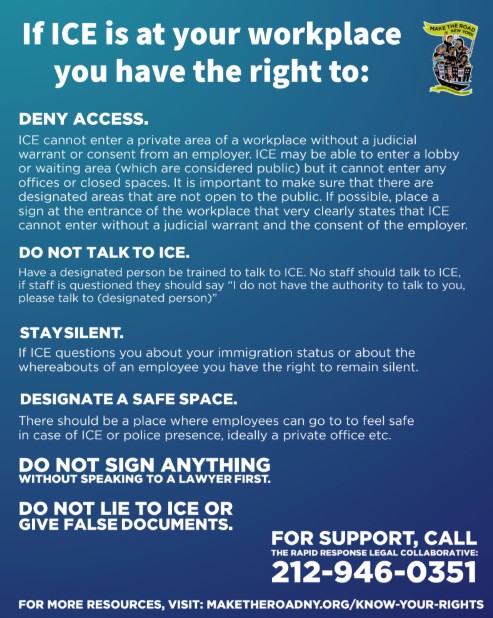Immigration attorney Michael Mandel told members of the Port Washington Chamber of Commerce on Tuesday, Aug. 12, that businesses must be proactive in planning for potential encounters with the U.S. Immigration and Customs Enforcement, stressing that preparation is key to protecting both employees and customers.
More than 1,600 people with prior convictions have been arrested by ICE agents across Long Island since President Donald Trump took office on Jan. 20, according to published reports. It is unknown how many more without criminal records have been arrested.
But immigrants without prior convictions have been arrested across Long Island, including Port Washington bagel store manager Fernando Mejia, of El Salvador, and Suffolk County Community College honor student Sara Lizeth Lopez Garcia, of Colombia.
Speaking before members of the Port Washington Chamber of Commerce, Mandel acknowledged the political divisions around immigration but framed the issue in terms of community safety and business stability.
“No matter our political differences, we all want thriving local businesses, so I am here to give you info that will hopefully help you keep your employees and customers safe, which in turn is good for business and good for Port,” Mandel said at the meeting.
Mandel, who works for Kauff McGuire & Margolis LLP and has practiced immigration law for more than two decades, emphasized that ICE arrests often involve people with no serious criminal records.
“A common misconception is that it’s only serious criminals who are being arrested, kidnapped, detained and deported by ICE” he said. “That is categorically false – they are in the statistical minority. Most arrested have nothing more than lack of valid immigration status or very low level offenses.
One of Mandel’s central messages was the importance of recognizing the difference between judicial warrants, which must be honored, and administrative warrants, which do not permit ICE to enter private business areas.
A judicial warrant is issued by a judge and will list a court name, the scope of the search or seizure, the individual to be arrested, and a time frame for enforcement. In contrast, an administrative warrant — typically signed by an ICE or Department of Homeland Security officer — does not authorize entry into private spaces, Mandel explained.
“Nevertheless, ICE will often try to trick employees into granting access by trying to make it appear that they have a judicial warrant,” Mandel said.
Mandel urged businesses to create clear internal protocols to handle potential ICE visits. At minimum, he said, employers should designate a first point of contact, such as a receptionist or cashier who knows not to grant access without a judicial warrant.
He recommended a four-step response plan:
- Ask ICE agents for names, badge numbers, and their agency.
- Ask why the agents are there and instruct them to wait in a public area and state clearly that private areas are off limits without a judicial warrant.
- Decline to answer questions, noting the employee is not authorized to speak for the employer and that she will call the boss.
- Immediately notify the owner, manager, or attorney, and keep contacting people until they get through to someone who can intervene.
“If ICE shows up, everyone should stay calm. No one should run from ICE, lie or provide false documents. Again, no one has to answer any questions. Instead, they can say ‘I choose to remain silent.’” he said.

Beyond employer responsibilities, Mandel stressed that individuals have rights when questioned by immigration agents. Employees and customers alike are not required to answer questions in public areas and may assert the right to remain silent or request a lawyer.
Mandel said no one is required to present identification to ICE.
“Note that since anyone in New York can get a driver’s license, that is not proof of US citizenship or valid immigration status,” he said. If you are concerned that you might be targeted, Mandel suggested carrying a copy of your US passport or birth certificate, but green card holders, permanent residents, must carry their green card at all times.
Mandel encouraged business owners to share this information with staff and consider posting signs in storefront windows declaring immigrant-friendly support. Similar to rainbow flags that signal inclusivity, he said, the message is more symbolic than legal but helps build trust.
He also urged community members at risk to prepare emergency plans in case of arrest, including memorizing a trusted phone number and arranging contingencies for children, medical needs, and finances.
“I know that small businesses operate like families. You care deeply about your employees and customers and don’t want anything to happen to them,” he said. “Sharing this information with them is one way you can show them how much they mean to you.”
As Mandel put it, “It is less about ICE – they’ll enter whatever business they want. It’s more about sending a message to employees, customers and the community that your business is immigrant friendly. It’s an easy yet meaningful way to show a vulnerable, panicked community that you see them, you value and respect them, and you believe they belong here.”


































